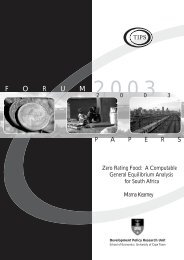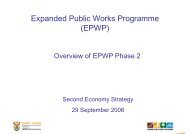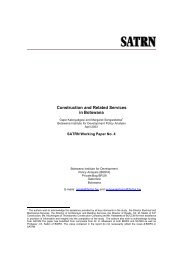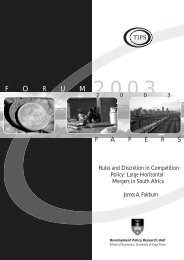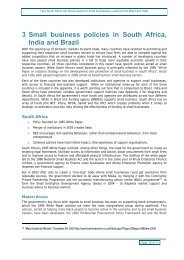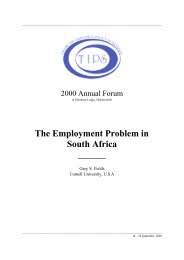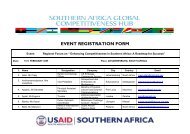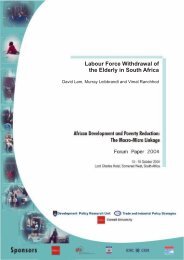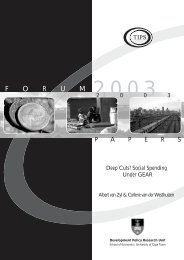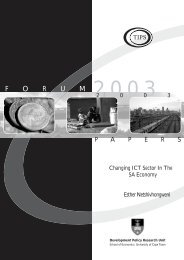(AsgiSA) Annual Report 2008 - South African Government Information
(AsgiSA) Annual Report 2008 - South African Government Information
(AsgiSA) Annual Report 2008 - South African Government Information
You also want an ePaper? Increase the reach of your titles
YUMPU automatically turns print PDFs into web optimized ePapers that Google loves.
Accelerated and Shared Growth Initiative for <strong>South</strong> Africa<br />
ANNUAL REPORT<br />
<strong>2008</strong><br />
2. Macroeconomic overview<br />
To achieve the objective of halving poverty and unemployment by 2014, <strong>AsgiSA</strong> estimated<br />
that the economy would need to grow on average by 4,5% per annum between 2004 and<br />
2009, and reach an average growth of 6% for the period 2010 to 2014. To achieve this accelerated<br />
growth, it was estimated that gross fixed capital formation (GFCF as physical investment<br />
spending) will need to grow by about 10% a year, with investment as a percentage of<br />
gross domestic product (GDP) rising from 16% to 25% by 2014.<br />
In respect of macroeconomic policy, <strong>AsgiSA</strong> argued that inflation targeting should remain a<br />
government policy to lower inflation and interest rate volatility; thereby not only reducing<br />
exchange rate volatility but also positively contributing to lowering international risk<br />
premiums. <strong>AsgiSA</strong> also argued for retaining the policy of a floating exchange rate regarding<br />
the value of currency and currency volatility, and that the fiscal and monetary authorities<br />
must explore possibilities and opportunities to reduce the currency’s volatility and ensure,<br />
as far as possible, that the level and stability of the currency supports balanced growth. This<br />
should include committing resources to support accumulation of foreign exchange reserves.<br />
Economic growth averaged 3% for the period 1994 to 2003 and averaged growth of over<br />
5% from 2004 to 2007 – the <strong>AsgiSA</strong> period. This robust growth was backed by progressively<br />
entrenched macroeconomic stability accompanied by sound and transparent fiscal and monetary<br />
policies. This resulted in, among other things, a relatively lower inflation and interest<br />
rate environment, the closing of the forward book by the <strong>South</strong> <strong>African</strong> Reserve Bank (SARB)<br />
and a build-up of foreign exchange reserves. It is possible to question whether a more vigorous<br />
reserve accumulation strategy and a more cautious fiscal policy should have been followed,<br />
as a relatively overvalued exchange rate and rapidly expanding demand contributed<br />
to a rising balance of payments deficit, which eventually undermined our performance.<br />
Real annual GDP at market prices increased by 3,1% in <strong>2008</strong>, following an increase of 5,1%<br />
in 2007. The slowdown in growth for <strong>2008</strong> is mainly as a result of the electricity emergency<br />
in the first quarter of <strong>2008</strong> when growth of only 1,7% was recorded and a decline of growth<br />
of 1,8% in the fourth quarter as the global economic crisis started impacting on the <strong>South</strong><br />
<strong>African</strong> economy. While the growth target was hit for the first four years of <strong>AsgiSA</strong>, the next<br />
period will be a greater challenge.<br />
Inflation accelerated way beyond the upper limit of the inflation target range of 3% to 6%<br />
during <strong>2008</strong> with CPIX inflation peaking at 13,6% in August <strong>2008</strong>, mainly as a result of<br />
higher global commodity prices, in particular energy prices and a weaker exchange value of<br />
the Rand. Since then, inflation has decelerated and is expected to be back within the inflation<br />
target range by the third quarter of 2009 as global economic growth slows down as a<br />
6



